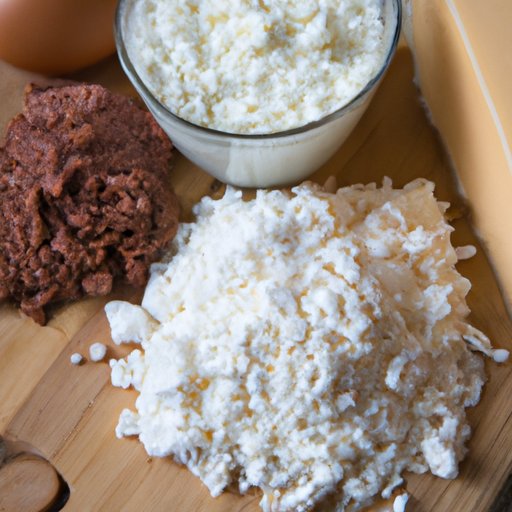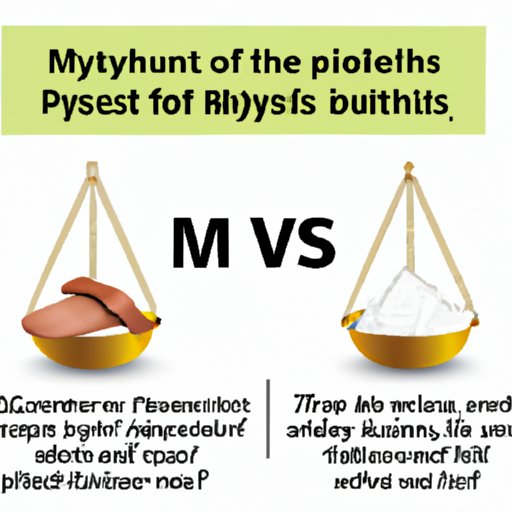
I. Introduction
Protein is an essential macronutrient that is crucial for maintaining a healthy body. When it comes to weight loss, protein plays a vital role in shedding those extra pounds and keeping them off. However, many people don’t know how much protein they should consume, nor do they realize the many benefits it offers. This article will provide a comprehensive guide to help readers understand how much protein they should eat for weight loss and maximize the benefits it offers.
II. The Benefits of Protein for Weight Loss
Eating a high-protein diet has been shown to be effective for weight loss. The reason for this is that protein helps to boost your metabolism, which is the rate at which your body burns calories. In fact, studies show that a high-protein diet can increase your metabolism by up to 80-100 calories per day, compared to a low-protein diet.
Additionally, protein helps to curb cravings and overeating. This is because protein takes longer to digest than carbohydrates or fats, which makes you feel fuller for longer periods of time. This can reduce your overall calorie intake and help you lose weight in the long run.
Another benefit of protein is that it promotes muscle growth. As you lose weight, you will also lose muscle mass if you don’t consume adequate protein. However, consuming enough protein can help to preserve your muscle mass and promote fat loss instead.
So, how much protein should you eat for weight loss? The amount of protein you need depends on several factors, such as your body weight, lifestyle, and health goals.
III. Different Protein Sources and Their Benefits
There are many sources of protein, and it’s essential to choose the right ones to maintain a healthy and balanced diet. For vegetarians and vegans, high-protein plant-based foods are an excellent option, while non-vegetarians can opt for lean meats, dairy, and eggs.
Some examples of protein-rich plant-based foods include lentils, chickpeas, tofu, quinoa, and almonds. These foods are also high in fiber, vitamins, and minerals, making them beneficial for overall health.
For meat-eaters, lean meats like chicken, turkey, and fish are excellent sources of protein. Eggs and dairy products like yogurt and cottage cheese are also high in protein and low in fat.

IV. Debunking Common Myths About Protein and Weight Loss
There are many myths surrounding protein consumption and weight loss. One of the most common is that consuming too much protein can harm your kidneys. However, there is little evidence to support this claim, and studies show that a high-protein diet is safe for people with healthy kidneys.
Another myth is that a high-protein diet is bad for bone health. However, studies show that a diet high in protein can improve bone density and reduce the risk of fractures.
V. Tips and Tricks for Incorporating More Protein into Your Diet
If you’re looking to add more protein to your diet, there are many ways to do so. For example, you can add protein powder to a smoothie, eat high-protein snacks like nuts or jerky, or include protein-rich foods in your meals.
Here are some suggestions for meals that are high in protein:
- A spinach and mushroom omelet with turkey bacon
- Baked salmon with roasted vegetables
- A quinoa, black bean, and avocado bowl
In addition to these meal ideas, there are many high-protein recipes available online, such as protein pancakes or protein-packed power bowls.
VI. Timing Protein Consumption for Weight Loss
While it’s essential to consume enough protein throughout the day, the timing of your protein intake can also affect weight loss. Studies show that consuming protein before or after a workout can help to promote muscle growth and weight loss.
If you’re looking to maximize the benefits of protein, try consuming a protein shake or a protein-rich snack before or after your workouts.
VII. Protein Intake and Different Types of Exercise
Finally, it’s essential to adjust your protein intake based on the type of exercise you’re doing. For example, if you’re doing strength-training or powerlifting, you may need to consume more protein to build muscle mass.
On the other hand, if you’re doing yoga or endurance workouts, you may not need as much protein, but it’s still crucial to consume enough to support your overall health and weight loss goals.
VIII. Conclusion
Eating enough protein is crucial for weight loss and maintaining a healthy body. By understanding the benefits of protein, choosing the right protein sources, and incorporating protein into your diet, you can optimize the benefits it offers and achieve your weight loss goals.
Remember, the amount of protein you need depends on your body weight, lifestyle, and health goals. By taking the time to learn about the different sources of protein and how to incorporate them into your diet, you can achieve lasting weight loss and overall good health.





